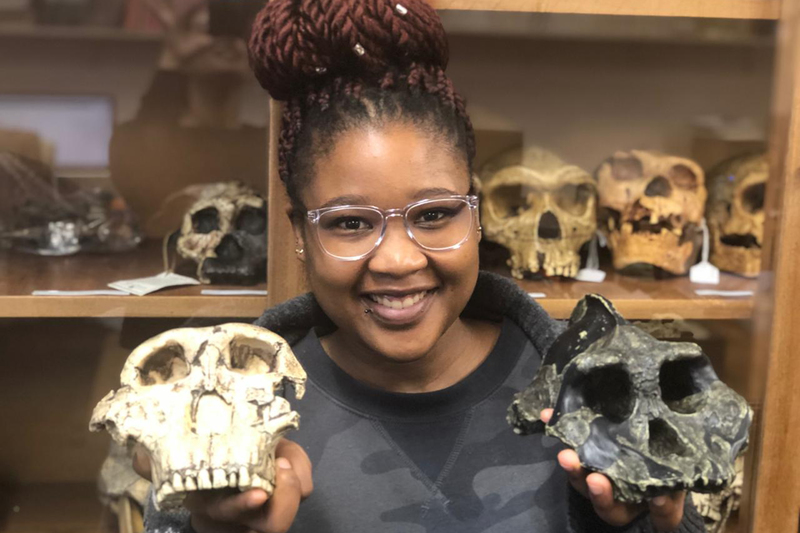Cultivating the next great palaeoanthropologist
13 June 2019 | Story supplied. Photo supplied. Read time 5 min.
The story of human evolution has long been told with fossils from South Africa – discovered by a privileged few. The Human Evolution Research Institute (HERI) at the University of Cape Town (UCT) aims to change that with a new generation of female scientists.
“We have an incredible record of human evolution in South Africa, but the entire narrative of palaeoanthropology has been dominated by white men, many of whom are not even South African,” says HERI’s director, Dr Robyn Pickering.
“We want to disrupt this narrative by supporting South African researchers from all backgrounds and telling our origin story with a diverse and inclusive team.”
Breaking down barriers
HERI aims to do this with several new projects that break down barriers faced by young researchers. Among these are annual field camps that give women confidence in the rough and remote sites their research will take them.
“Fieldwork is a big aspect of palaeoanthropology, but many of these women don’t know what to expect because they’re not exposed to hiking and camping in their upbringing,” says Pickering.
Apart from feeling unprepared, women can also be subjected to a boys’ club mentality and sexual harassment. This is harmful not only for palaeoanthropology, but for other field-based sciences.
“Harassment and inappropriate conduct are a reality in the field. Through these camps, we hope to inform codes of conduct throughout the faculty that improve equality and safety,” says HERI’s deputy director, Professor Rebecca Ackermann, who is UCT’s deputy dean of transformation in the Faculty of Science.
HERI is also investing in black women who want to pursue careers in palaeoanthropology, including archaeology, geology and evolutionary biology. The institute has launched a call for applications to two PhD fellowships and one postdoc fellowship for three years of study starting in 2020.
“I love what I do. Having access to this history on our doorstep means I can be proud of where I come from and what I’m doing to tell our story and our origin story as a black South African woman.”
The financial support is important not only to give opportunities to those who need it, but to create role models that inspire upcoming black researchers.
“This funding is critical to ensuring that these women stay in academia and show that they have a rightful place in palaeoanthropology,” says Pickering.
Building an inclusive space
HERI has been committed to the diversity agenda since its start in 2016, under the directorship of Ackermann. It has now strengthened that stance thanks to support from UCT’s Advancing womxn fellowships.
Led by the university’s Vice-Chancellor Professor Mamokgethi Phakeng, the initiative awarded five women researchers at UCT in February for projects that help women’s voices to be heard.
With only 39% of science researchers in South Africa being women, the initiative and HERI’s new voice couldn’t come at a better time.
“It’s about time institutions and groups made it part of their memorandum to include young black women and people of colour. And not just say it, but actually execute and implement that vision,” says HERI student Nomawethu Hlazo.
Hlazo is PhD student in archaeology at UCT. She is studying fossils of Paranthropus, a distant human relative that was discovered in east and South Africa.
With only 39% of science researchers in South Africa being women, the initiative and HERI’s new voice couldn’t come at a better time.
At present, she is the only black South African woman, and one of only a few South Africans, to focus her research on the evolution of these fossils.
“I love what I do. Having access to this history on our doorstep means I can be proud of where I come from and what I’m doing to tell our story and our origin story as a black South African woman,” Hlazo says.
Building an inclusive space to do this research, however, should include all underrepresented groups in South Africa, says Pickering.
“It doesn’t matter where you fit on the gender spectrum or what colour you are,” she says. “If you’re committed to excellent science and to giving respect and acknowledgement to others, then you’re playing a part in change.”
Learn more about HERI’s fellowship opportunities.
 This work is licensed under a Creative Commons Attribution-NoDerivatives 4.0 International License.
This work is licensed under a Creative Commons Attribution-NoDerivatives 4.0 International License.
Please view the republishing articles page for more information.










